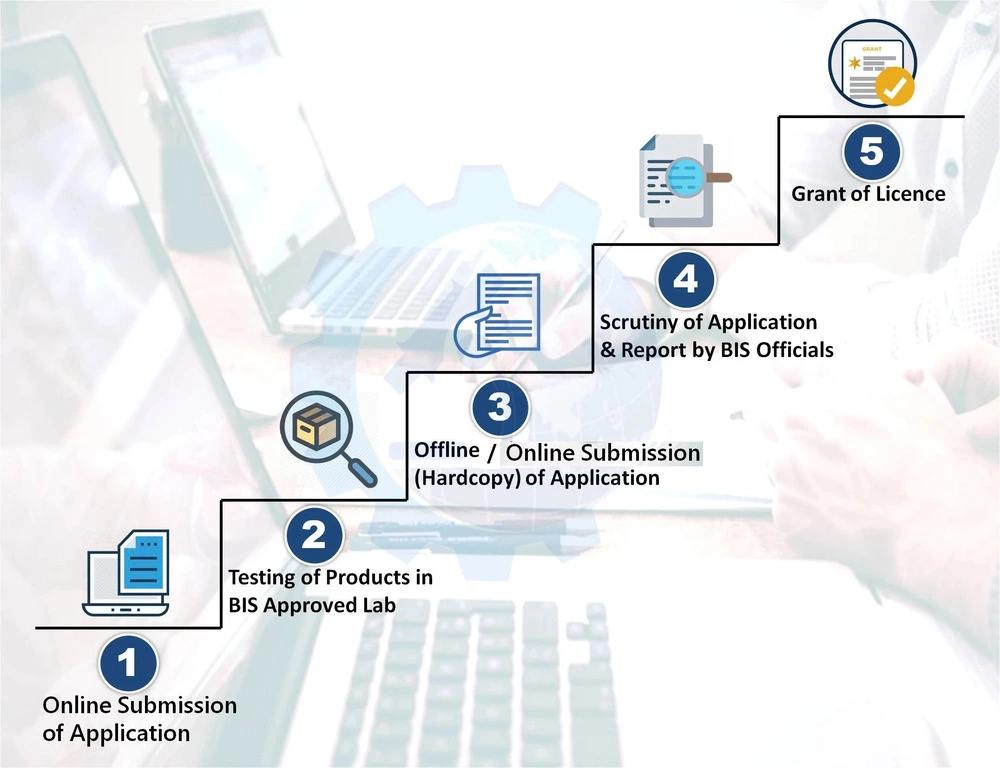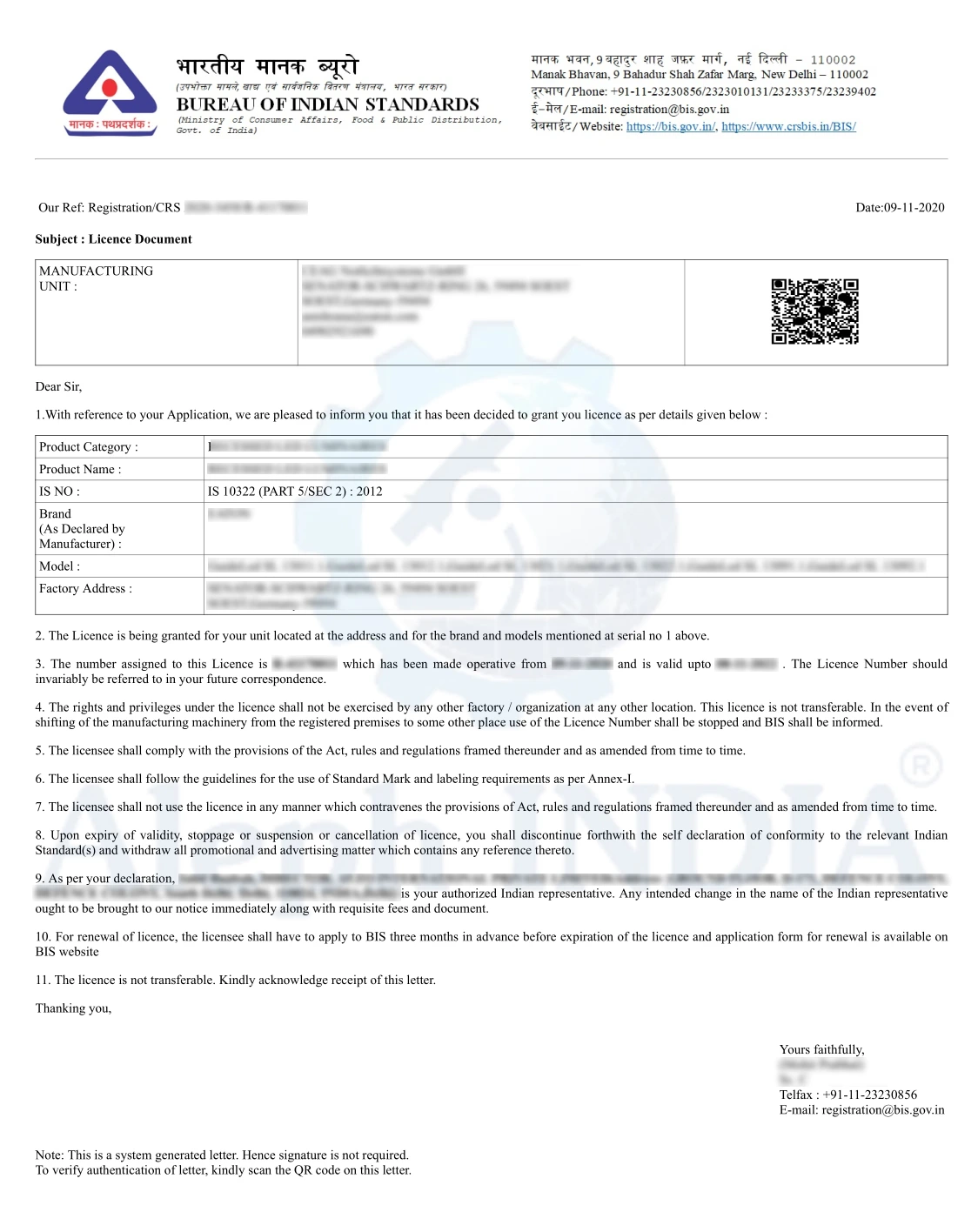INTRODUCTION
BIS Registration is getting a license from the Bureau of Indian Standards (BIS) for any product that conforms with the applicable Indian Standards. The Bureau of Indian Standards is the National Standards Body of India established under the Bureau of Indian Standards Act, 2016, under the Indian Ministry of Consumer Affairs, Food & Public Distribution, Government of India. The BIS is involved in various activities like Standards Formulation, Product Certification, Testing, Training Services, Hallmarking, Laboratory Services, Calibration Schemes, etc. The BIS registration acts as a third-party assurance of product quality, safety, and reliability.
The Bureau of Indian Standards grants licenses to the manufacturers for their products listed in BIS's mandatory or voluntary certification schemes. A manufacturer can display the standard mark on their product after obtaining a license from BIS. Although obtaining a BIS license is voluntary, the Indian government has made certain products mandatory to protect the environment, public health, national security, and the welfare of people, animals, and plants. It also aims to prevent unfair trade practices.
"Meet BIS standards, the mark of trust; Manufacture with precision, products robust;
Market expansion, with certification in hand;
Mastery over compliance, in the Indian market you'll stand;
And growth and prosperity will be your brand."
BIS Registration, or significant quality control compliance, is necessary when discussing electronic and IT products. This page will give you complete knowledge about BIS Registration under the Compulsory Registration Scheme (CRS) on this page. Let's examine the nature, organs, and history of the BIS License to understand the necessity of BIS registration certification.
Let's understand the BIS Registration for Electronics and IT Products.
COMPULSORY REGISTRATION SCHEME (CRS)
In 2012, the Department of Electronics and Information Technology (DeitY) and the Bureau of Indian Standards (BIS) jointly introduced the Compulsory Registration Scheme (CRS) to safeguard Indian consumers against counterfeit and substandard goods. Electronic and IT products fall under the BIS CRS scheme. As per this scheme, a BIS license is mandatory for
electronics and IT products before launching them into the market.
The Ministry also issued Compulsory Registration Orders, which state that no one shall manufacture or store for sale, sell, import, or distribute goods that do not meet the Indian standards outlined in the order and do not bear the Standard Mark with a unique registration number.
Under the Compulsory Registration Scheme (CRS), the Bureau of Indian Standards issues a BIS registration certificate to manufacturers to use a standard mark with a unique registration number on their electronics and IT products. BIS Registration is based on your self-declaration of conformity for goods and articles as per Indian Standards. BIS licenses provide third-party assurance to the consumers that the product complies with the quality standards required by law and is safe to use. BIS Licence for electronic products and their operation is governed by the conformity assessment scheme outlined in Scheme II of Schedule II of the BIS (Conformity Assessment) Regulations, 2018.
We know that so many questions are tingling in your mind at this moment, but don't worry. Let's have a look at the complete BIS Registration process (BIS registration Requirement/Procedure/timeline/Cost).
Products covered under Compulsory Registration Scheme
To be precise, 79 categories of products have been covered under CRS till now, 63 of which were added by MEITY, five by MNRE, and eight by MHIPE. If you are a manufacturer of any electronic or IT products, we are sure that you are willing to know your product's specifications and Indian Standards. BIS Mandatory product list is given at the end of this article. You can learn more by searching the product names or Indian Standards at the end of this article for products covered under BIS compulsory registration scheme. If you have any queries regarding the latest update about BIS registration license, kindly email us at [email protected]
LIST OF PRODUCTS UNDER COMPULSORY REGISTRATION SCHEME
BIS REGISTRATION PROCESS UNDER COMPULSORY REGISTRATION SCHEME(CRS)
The BIS Registration procedure in accordance with the BIS CRS Scheme is given below.
- Online application submission: First, the Applicant shall apply on the BIS online CRS portal by filling out the BIS registration form in order to get login credentials.
- Testing of product in BIS approved lab: Applicants need to generate test requests by logging in with their credentials and getting their product tested from a BIS-approved lab.
- Offline/online submission of Application: After that, the Applicant must apply on the portal using the verified Test Report within 90 days of its issue and submit all required documents in accordance with the checklist.
- Scrutiny of application: BIS officials will review the test report and all documents submitted with the application.
- Grant of BIS license: Bureau will grant a BIS license to the manufacturers to use or apply Standard Mark with a unique R-number on their electronics and IT products.

Sample of a Grant Certificate for CRS
BIS Registration Requirements
The following are the essential requirements for BIS registration under CRS:
- First of all, if you are a manufacturer of any product covered under the CRS Scheme, then registration is required for that product before launching them into the market.
- The manufacturer seeking to register to use or apply BIS Standard Mark on their product shall conform to the requirements of Indian Standard Specifications.
- A BIS license will be granted to you by BIS based on your self-declaration of conformity of the product with the application you are submitting.
- This self-declaration of conformity from you indicates that your manufacturing infrastructure can produce quality products with the necessary testing facilities, which can only test the products in the prescribed period at your premises.
Guideline for Compulsory Registration Scheme

DOCUMENTS REQUIRED FOR BIS REGISTRATION
The following documents are required for BIS Registration under the CRS scheme
for electronic products.
- Self-Declaration of Conformity
- Test Report Conformity by Third-Party Testing Laboratory of Product Samples (Components and Raw Materials).
- Name and Address proof of the manufacturing unit and the scope of business activity.
- Copy of acknowledgement received from the portal
- Details of Authorized Signatory and other related documents
- Details of the samples to be tested by BIS
- Also, the details of the product's Models/Varieties to be covered
BIS REGISTRATION COST/FEE STRUCTURE FOR ELECTRONICS PRODUCTS
The following is the BIS Registration Fee for Electronics and IT Products:
| Type of fee |
New Application |
Renewal |
Inclusion |
| Application Fee |
Rs. 1000/ |
Rs. 1000/ |
- |
| Processing Fee* |
Rs. 25000x2 = 50000/ |
Rs. 25000x2 = 50000/ |
Rs. 15000x2 = 30000 |
| Registration Fee* |
Rs. 1000x2 = 2000/ |
Rs. 1000x2 = 2000/ |
- |
| Total |
Rs. 53000/ |
Rs. 53000/ |
Rs. 30000/ |
*Note:
- The processing fee & registration fee is required for min 2 year
- The above fee is for one test report; for each additional test report, an additional processing
fee of Rs. 20,000/- will be charged for the New Application and inclusion.
- The cost of BIS registration for electronic products will vary depending on the following
factors
- Location of Manufacturer. (Domestic/Overseas)
- Type of Product and Number of Models
- Applicable government fee and service fee.
|
TIMELINE TO OBTAIN BIS LICENCE
If you have previously tested your product and want to use the previous test reports
for BIS CRS Certification, the test reports must be no older than 90 days from the date of online application
receipt.
If you want to submit a supplementary test report from a brand whose product has
already been tested and accepted by BIS, the report must be no older than 90 days from the date of application.
If all of the documents submitted are in order, the BIS registration will be processed
by BIS. Independent samples are picked up only during the surveillance process.
BIS Licence will be awarded within 20 working days if all submitted documentation and
test reports are in order. If the documentation and conformity are unsatisfactory in the first instance, the BIS
officer will give you a rejection notice if the shortcoming is not rectified within 30 days.
VALIDITY & RENEWAL OF BIS LICENSE
BIS licence for electronics products will be granted for a minimum of two years. If
there is no adverse feedback in the frequent observation, the BIS certificate/licence must be considered for renewal
in a minimum of two years at the licensee's request.
If the renewal application and requisite fee are not received from the licensee within
90 days of the validity date (2 years), the BIS licence will be considered expired.
Acceptance of the request for renewal of the BIS Licence will also depend on the
application fee, annual fee, processing charge, and any dues that must be submitted prior to the request for renewal
of the BIS Licence.
Conclusion:
It is mandatory to obtain BIS registration for Electronics and IT products covered
under the Compulsory registration scheme before launching them into the market. All electronics product
manufacturers must get BIS registration for their products to use BIS Standard Mark with R-number.
If you are looking for BIS Registration, please contact Aleph India. Aleph India BIS
Registration Consultant assists manufacturers and importers in obtaining BIS registration for their products in a
timely manner by providing valuable insights and assistance at each stage of the BIS Registration Process.
Aleph India Group is a global consulting firm that provides advisory and consulting
services to a wide range of industries in India and around the world to meet regulatory compliance and industry
standards required to run a business efficiently. Aleph INDIA offers manufacturers and importers a one-stop shop for
all kinds of product certification, testing, training, auditing, and other compliance services, enabling them to
achieve higher production efficiency and quality standards.












